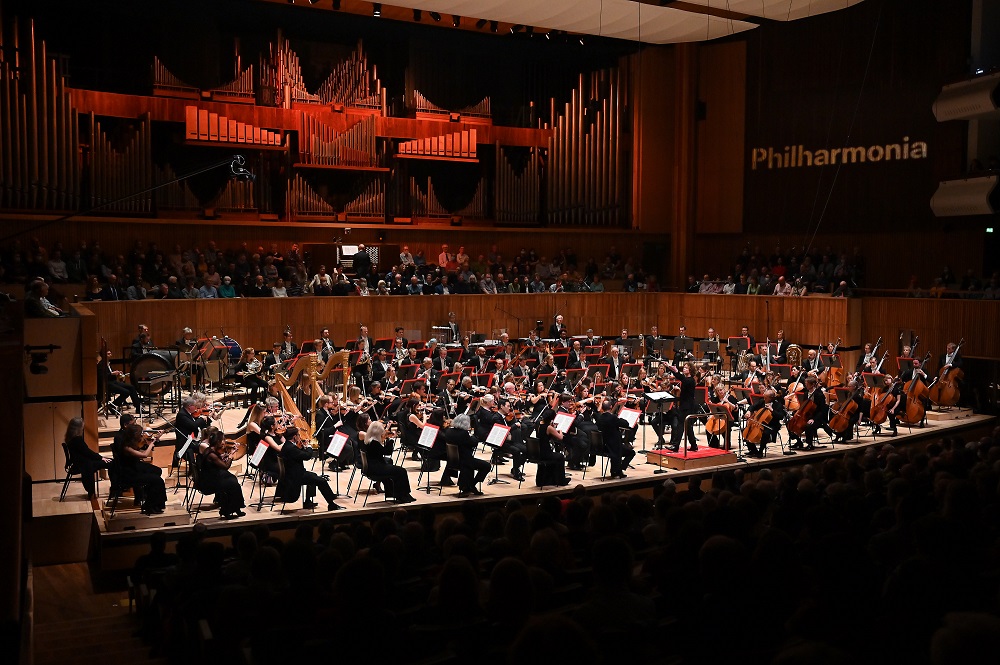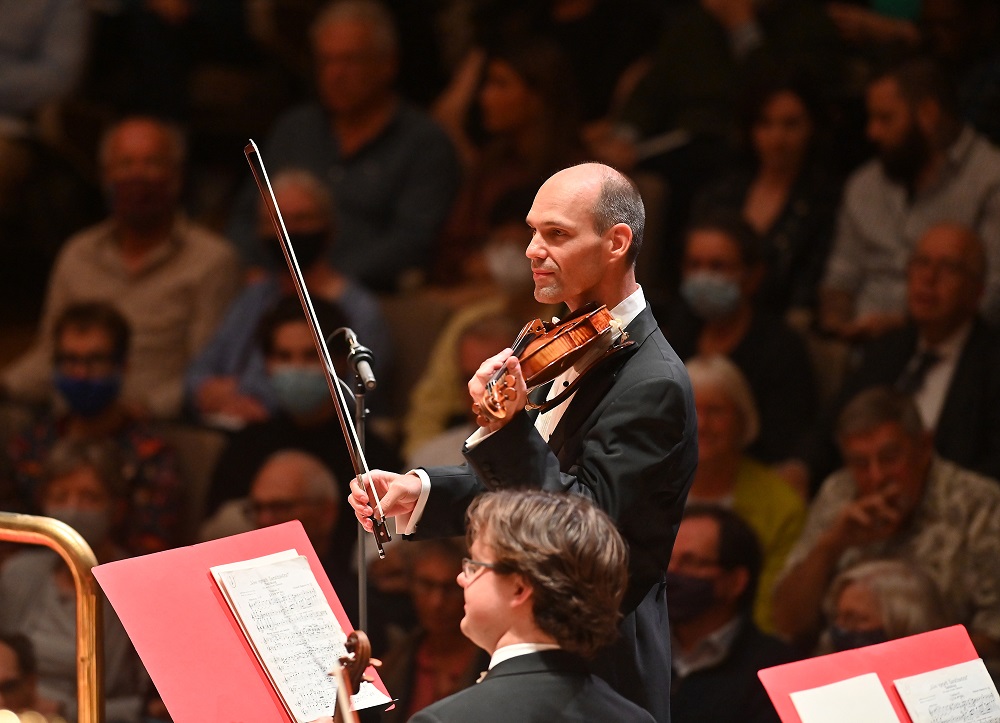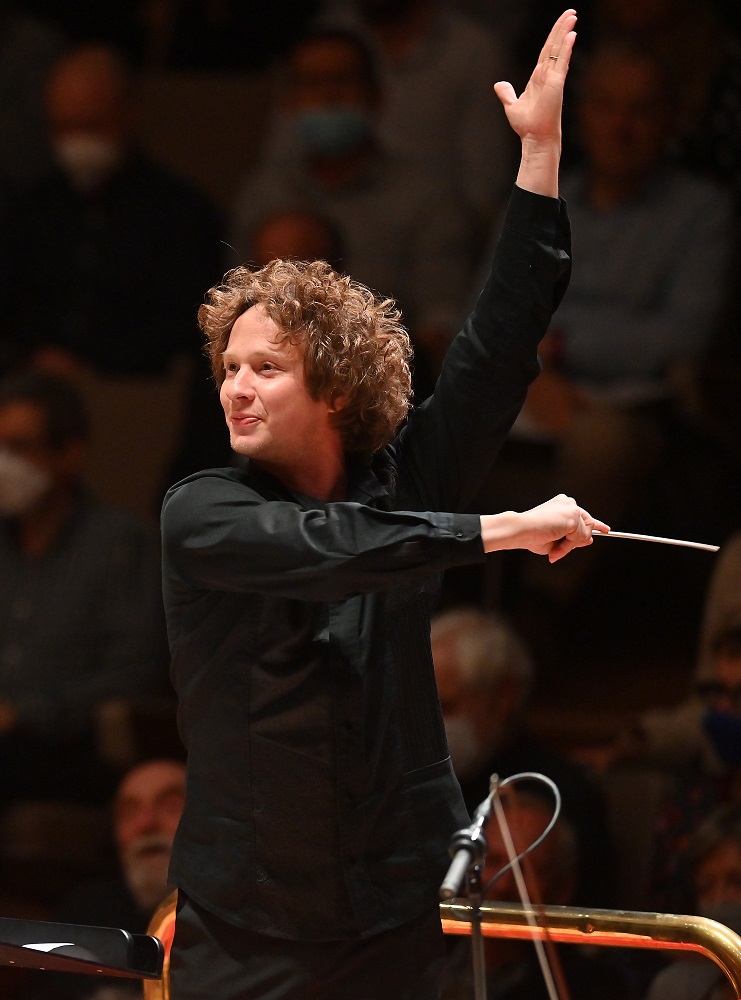Philharmonia, Rouvali, RFH review - the really big orchestra is back for cosmic Strauss | reviews, news & interviews
Philharmonia, Rouvali, RFH review - the really big orchestra is back for cosmic Strauss
Philharmonia, Rouvali, RFH review - the really big orchestra is back for cosmic Strauss
Who'd have thought it? Two enormous scores in one dazzling concert
Two suns, two moons, two Philharmonia leaders sharing a front desk, two aspirational giants among Richard Strauss's symphonic poems bringing the number of players, in the second half, to 134.
Never mind the long-term implications; by the time we reached the huge arc of Strauss’s one-movement Alpine Symphony, everyone in the audience must surely have been feeling the physical and emotional sensation of that mass sound, and wondering at what a remarkable thing a full symphony orchestra is. Not to be taken for granted, and in any case no chance of that with the formidable control of Santtu-Matias Rouvali, launching his first season as the Philharmonia’s principal conductor in what he does best – the big late-romantic scores. 
This dazzling display of a semi-double-violin concerto seemed to ignite the rest of the strings, and from the point at which they all join the dance through to the exquisite nocturne with its unresolved question at the end of the work, the performance shone with that special incandescence Rouvali seems uniquely able to get from his orchestra.

In the many big climaxes you felt the full force of the glorious Philharmonia sound going straight through the body and piercing the soul; something we'd almost forgotten in the last 18 months, and there’s nothing like it. But the chamber musical refinement of so many passages in both symphonic poems was wondrous too. So, splendid signs for Rouvali’s regency, and an apt start for what they've called the "Human/Nature" season, though we wait to see if he’ll programme with the same ambition as his predecessor Esa-Pekka Salonen, or as his opposite numbers, Rattle at the LSO, Gardner at the LPO and Oramo at the BBC Symphony Orchestra, are already doing. But in terms of living masterfully in the moment, there’s already nothing like the Philharmonia/Rouvali partnership. And please, Southbank Centre, at least try to make your audiences aware of mask-wearing guidelines, or the season may come to an abrupt halt.
rating
Share this article
Add comment
The future of Arts Journalism
You can stop theartsdesk.com closing!
We urgently need financing to survive. Our fundraising drive has thus far raised £49,000 but we need to reach £100,000 or we will be forced to close. Please contribute here: https://gofund.me/c3f6033d
And if you can forward this information to anyone who might assist, we’d be grateful.

Subscribe to theartsdesk.com
Thank you for continuing to read our work on theartsdesk.com. For unlimited access to every article in its entirety, including our archive of more than 15,000 pieces, we're asking for £5 per month or £40 per year. We feel it's a very good deal, and hope you do too.
To take a subscription now simply click here.
And if you're looking for that extra gift for a friend or family member, why not treat them to a theartsdesk.com gift subscription?
more Classical music
 Kaploukhii, Greenwich Chamber Orchestra, Cutts, St James's Piccadilly review - promising young pianist
A robust and assertive Beethoven concerto suggests a player to follow
Kaploukhii, Greenwich Chamber Orchestra, Cutts, St James's Piccadilly review - promising young pianist
A robust and assertive Beethoven concerto suggests a player to follow
 Robin Holloway: Music's Odyssey review - lessons in composition
Broad and idiosyncratic survey of classical music is insightful but slightly indigestible
Robin Holloway: Music's Odyssey review - lessons in composition
Broad and idiosyncratic survey of classical music is insightful but slightly indigestible
 Classical CDs: Wolf-pelts, clowns and social realism
British ballet scores, 19th century cello works and contemporary piano etudes
Classical CDs: Wolf-pelts, clowns and social realism
British ballet scores, 19th century cello works and contemporary piano etudes
 Bizet in 150th anniversary year: rich and rare French offerings from Palazzetto Bru Zane
Specialists in French romantic music unveil a treasure trove both live and on disc
Bizet in 150th anniversary year: rich and rare French offerings from Palazzetto Bru Zane
Specialists in French romantic music unveil a treasure trove both live and on disc
 Scottish Chamber Orchestra, Ibragimova, Queen’s Hall, Edinburgh review - rarities, novelties and drumrolls
A pity the SCO didn't pick a better showcase for a shining guest artist
Scottish Chamber Orchestra, Ibragimova, Queen’s Hall, Edinburgh review - rarities, novelties and drumrolls
A pity the SCO didn't pick a better showcase for a shining guest artist
 Kilsby, Parkes, Sinfonia of London, Wilson, Barbican review - string things zing and sing in expert hands
British masterpieces for strings plus other-worldly tenor and horn - and a muscular rarity
Kilsby, Parkes, Sinfonia of London, Wilson, Barbican review - string things zing and sing in expert hands
British masterpieces for strings plus other-worldly tenor and horn - and a muscular rarity
 From Historical to Hip-Hop, Classically Black Music Festival, Kings Place review - a cluster of impressive stars for the future
From quasi-Mozartian elegance to the gritty humour of a kitchen inspection
From Historical to Hip-Hop, Classically Black Music Festival, Kings Place review - a cluster of impressive stars for the future
From quasi-Mozartian elegance to the gritty humour of a kitchen inspection
 Shibe, LSO, Adès, Barbican review - gaudy and glorious new music alongside serene Sibelius
Adès’s passion makes persuasive case for the music he loves, both new and old
Shibe, LSO, Adès, Barbican review - gaudy and glorious new music alongside serene Sibelius
Adès’s passion makes persuasive case for the music he loves, both new and old
 Anja Mittermüller, Richard Fu, Wigmore Hall review - a glorious hall debut
The Austrian mezzo shines - at the age of 22
Anja Mittermüller, Richard Fu, Wigmore Hall review - a glorious hall debut
The Austrian mezzo shines - at the age of 22
 First Person: clarinettist Oliver Pashley on the new horizons of The Hermes Experiment's latest album
Compositions by members of this unusual quartet feature for the first time
First Person: clarinettist Oliver Pashley on the new horizons of The Hermes Experiment's latest album
Compositions by members of this unusual quartet feature for the first time
 Gesualdo Passione, Les Arts Florissants, Amala Dior Company, Barbican review - inspired collaboration excavates the music's humanity
At times it was like watching an anarchic religious procession
Gesualdo Passione, Les Arts Florissants, Amala Dior Company, Barbican review - inspired collaboration excavates the music's humanity
At times it was like watching an anarchic religious procession

Comments
I wholeheartedly agree with
Perhaps not so surprisingly
Ah. By that stage I think
Ah. By that stage I think Maazel was to be avoided, so that's probably why I missed it. Frankly anyone with credentials as a Strauss conductor might avoid pairing these two, but given our release from Covid restrictions on numbers, this was a special case.
In the rehearsal Vistontay
Interesting, but at the risk
Interesting, but at the risk of sounding pedantic the early whoops (glissandi) are written for the second player on the front desk. So it really is a double concerto as Strauss wrote it. Whether BMG doubled up on anything is another matter.
I also attended this concert.